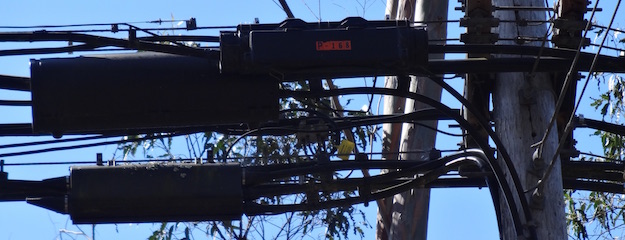CPUC considers open access to poles for mobile carriers

Mobile carriers use a lot of feet on poles, telephone and cable companies use a lot of poles.
Mobile carriers will get more or less the same access to utility poles as currently enjoyed by telephone and cable companies, if the California Public Utilities Commission approves a draft decision that’s scheduled to be on the table at its meeting on Thursday.
That would clear the way for the installation of small cellular access points on utility poles, making it easier for mobile carriers to greatly increase the coverage density of their networks, even down to the several-cells-per-city-block level that’s envisioned for 5G networks over the next five to ten years.… More

![By Jim Pickerell, 1936-, Photographer (NARA record: 4588217) (U.S. National Archives and Records Administration) [Public domain], via Wikimedia Commons](https://www.tellusventure.com/images/2015/11/double_parking.jpg)

![By User Minesweeper on en.wikipedia (Minesweeper) [GFDL (https://www.gnu.org/copyleft/fdl.html) or CC-BY-SA-3.0 (https://creativecommons.org/licenses/by-sa/3.0/)], via Wikimedia Commons](https://www.tellusventure.com/images/2015/11/eastshore_traffic.jpg)
![By Brian Cantoni (Flickr) [CC BY 2.0 (https://creativecommons.org/licenses/by/2.0)], via Wikimedia Commons](https://www.tellusventure.com/images/2015/11/instant_replay.jpg)

![By National Institute for Occupational Safety and Health (NIOSH) from USA (Highway construction workers using concrete saws) [Public domain], via Wikimedia Commons](https://www.tellusventure.com/images/2015/11/highway_construction_workers_using_concrete_saws.jpg)
![By Stephen zeigler (Own work) [CC BY-SA 4.0 (https://creativecommons.org/licenses/by-sa/4.0)], via Wikimedia Commons](https://www.tellusventure.com/images/2015/11/city_limit.jpg)
![By Wilson44691 (Own work) [Public domain], via Wikimedia Commons](https://www.tellusventure.com/images/2015/11/desert_tortoise.jpg)
![By Wayne Short (Edited version of File:Boxing080905.jpg) [Public domain], via Wikimedia Commons](https://www.tellusventure.com/images/2015/11/boxing_match.jpg)